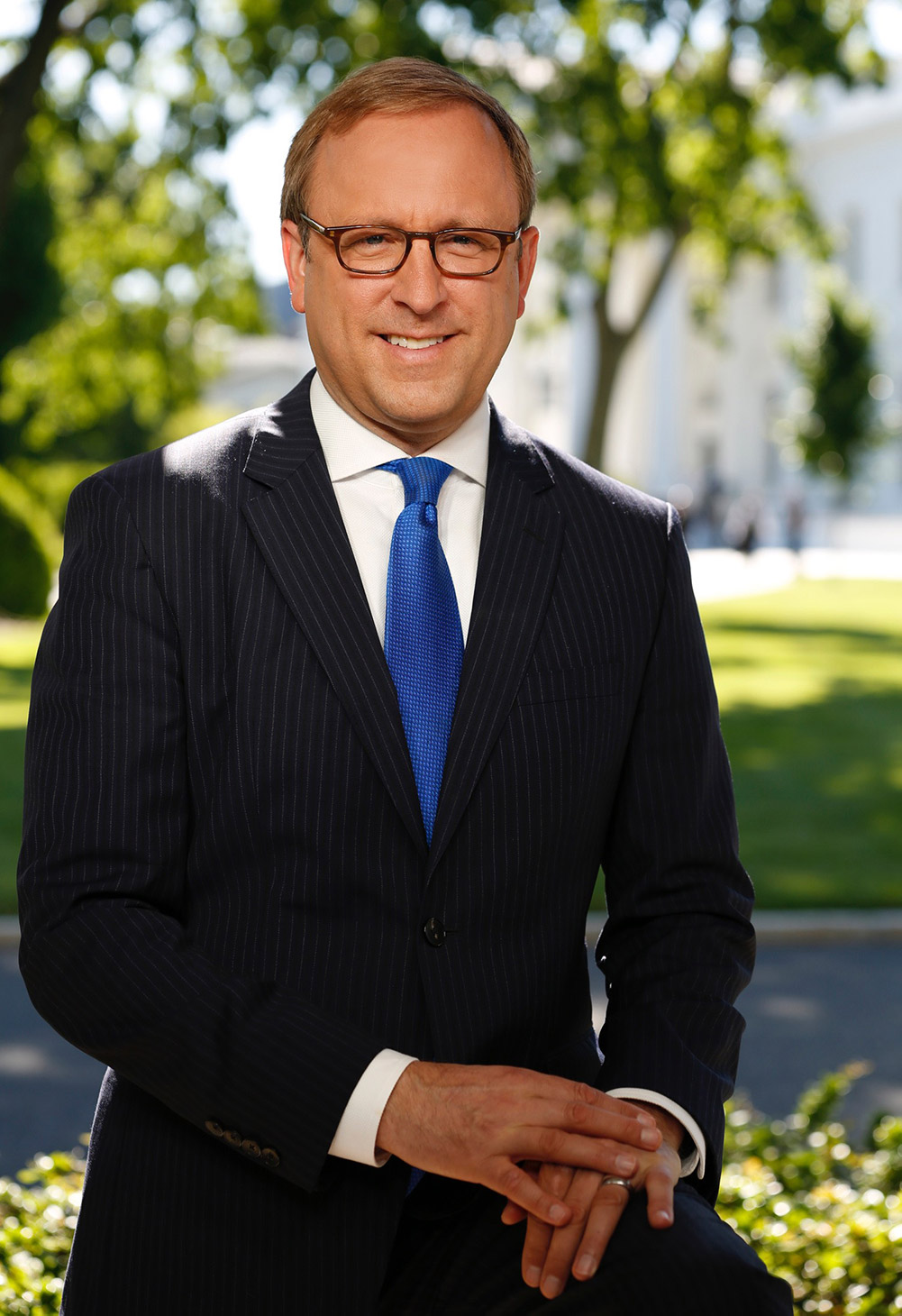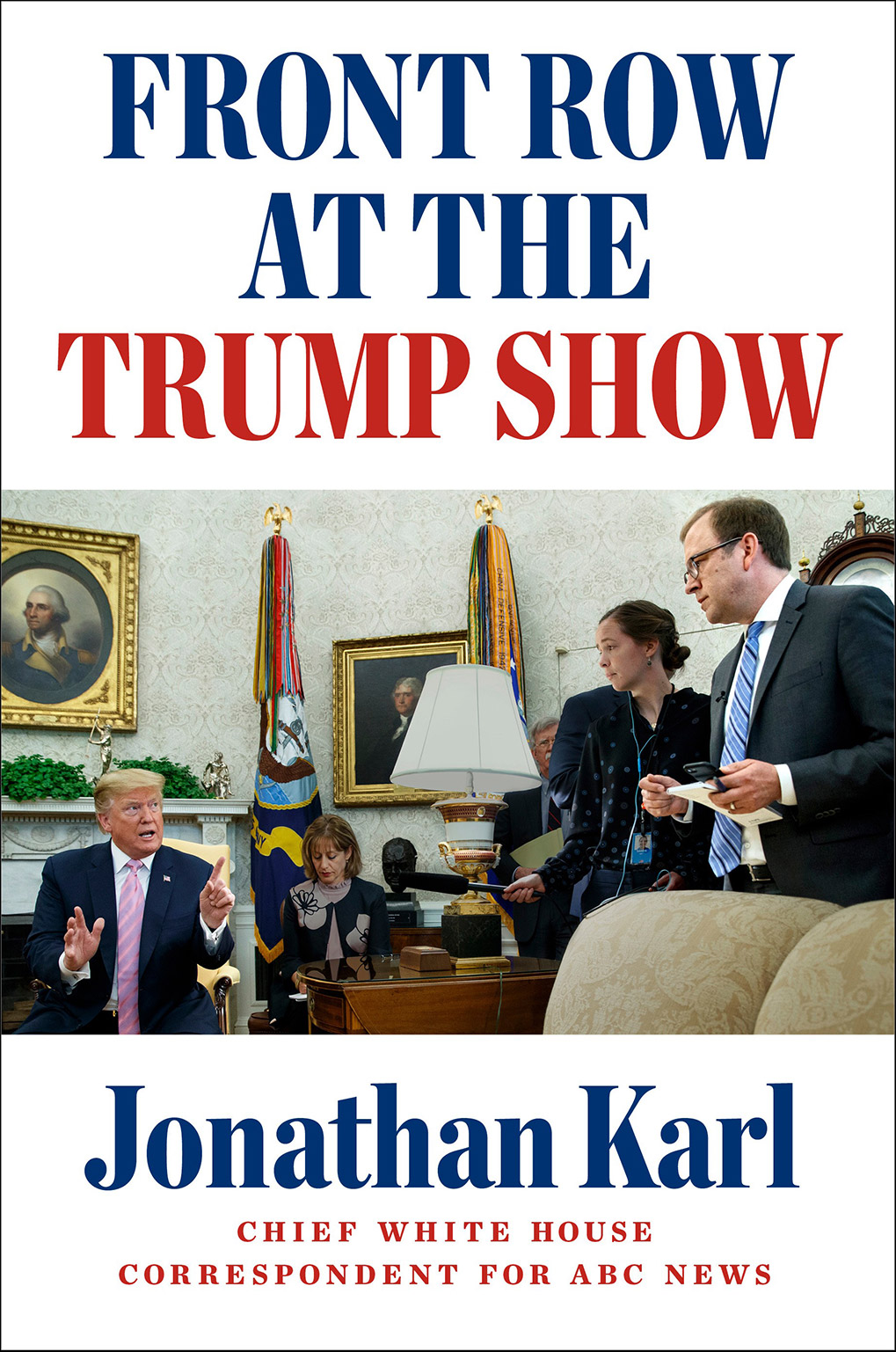A “Front Row” to the PresidencyJonathan Karl ’90’s New Book Takes Us Inside the White House
A “Front Row” to the PresidencyJonathan Karl ’90’s New Book Takes Us Inside the White House
As Chief White House Correspondent for ABC News, you will often find Jonathan Karl ’90 in the front row of the White House briefing room, asking questions of the President of the United States. He also serves as President of the White House Correspondents’ Association, which aims to “ensure a strong free press and robust coverage of the presidency.” It’s been a wild ride for the former Vassar sociology major, as he details in his new book, Front Row at the Trump Show.

You’ve known President Trump for more than 25 years, longer than nearly anyone else in the Washington press corps. When he was elected president, a lot of people were saying, “He’s an outsider, not a politician. He’ll need time to pivot to become fully presidential.” How do you think he’s done in that regard?
There was a jarring event on President Trump’s first full day in office when he went out to the CIA headquarters and gave an incredibly harsh political speech in front of those stars that represent the CIA officers who lost their lives in the line of duty. He viciously attacks the news media, talks about how many times he’s been on Time magazine and the size of the crowd at his inauguration, telling the CIA officers that were there that they all probably voted for him. And it struck me that he had become President of the United States just the day before. At that point, it was confirmed to me that he may grow in office but he’s never going to really change from the person I first met in 1994 as a reporter for the New York Post.
What about recently, when he had to deliver those horrific projections that 100,000-240,000 Americans could die from the pandemic, even if all the federal guidelines are followed?
It was certainly a moment where you could see that the numbers and the magnitude of the crisis had hit him perhaps in a way that it had not previously.
The one moment where I actually thought he might have changed came much earlier—two days after the election, when he met Barack Obama for the first time, and the two of them talked for about an hour in the Oval Office about all the immense challenges he would face. I came in with a small group of reporters to the Oval Office at the end of that meeting.
I put a picture that I took with my cell phone in the book where you see Donald Trump in a way that you’ve never seen him before. His posture is different. The expression on his face is different. It looks like the magnitude and the enormity of what he was about to embark on had hit him. And he praised Barack Obama at that moment, which was also something we had never seen before. I have to say, though, that it was an incredibly fleeting moment. I never saw him look like that or act like that again.
As a White House beat reporter, how do you navigate the responsibility to correct the record when a president lies, tells untruths, or exaggerates?
One of the biggest challenges for a reporter covering Donald Trump is to find a way to be aggressive, to ask tough questions, to correct errors and misstatements and outright falsehoods—but to do so in a way that doesn’t make it look like you are part of the political opposition. So, you need to fact-check in real time with this president. It’s more extreme because, frankly, he says more things that just aren’t true. But I generally do not say the word ‘lie’ when I’m talking about Donald Trump because I know that there’s a good chunk of the country that will tune out the minute you start saying the president is a liar and they won’t hear anything else you say. And the other thing is, when I say “lie,” it suggests that it’s an intentional misstatement. Now, many times it may be fully intentional, but I would rather have others make that judgment. I’m here to report what happened.

In the book, you also say that President Trump doesn’t get credit for some of the policies and decisions for which he should get credit. Does that indicate a bias in the press corps or something else?
It's a bias among journalists towards things that don’t go well. I mean, every president complains that the accomplishments of the administration are not recognized. This goes back literally to George Washington. But I’ve covered four presidents: Clinton, Bush, Obama, and now Trump, and every single one of them believes that the press was needlessly negative and did not focus on the accomplishments.
What do you think is the biggest accomplishment for which Trump has not gotten sufficient credit?
There’s been a lot of justifiable criticism for raising hopes about a cure for coronavirus and suggesting that certain drugs were really close to working, causing a stampede to stock up on these drugs. But I do think the way Trump has pushed the FDA to get drug trials started by cutting through the red tape is indicative of someone who doesn’t see the normal barriers that his predecessors saw. That can cause him to be a bull in a china shop and push forward. Sometimes, that’s a good thing.
When you were coming of age, you followed your mom and stepfather around the country as they did oral history interviews of the men who carved the presidents into Mount Rushmore. Did that experience plant a seed for a career where you’ve watched presidents up close?
It sure did. This project began when I was in sixth grade. And we actually moved out to South Dakota from Connecticut. We drove out in my stepfather’s van and lived in in two little, adjoining motel rooms. The nearest town was Hill City, which at the time had a population of 350 people.
They set out to find as many of the people as they could who had worked on Mount Rushmore. They started by putting an ad in the Rapid City Journal and getting one lead that led to another lead. But they were spread all out, mostly in the West. And I missed a lot of school as we drove around to places like Modesto, California and Reno, Nevada. But I learned a lot, including how to interview people. My mom and stepfather had a style of turning a tape recorder on and getting people talking. And their questions were as unobtrusive as possible.
Before you became Editor in Chief of The Spectator, the more conservative student newspaper at Vassar, you wrote a piece headlined “You’ve Got to Be Crazy Not to Take This Course.” What motivated you?
I had some legendary professors who challenged me every day. One was Walter Fairservis, an anthropology professor who was rumored to be the guy that Indiana Jones was based on and who taught a sweeping class called Comparative World Views. It covered everything from Plato to the autobiography of Malcolm X. Fairservis was just an incredibly energetic professor, almost superhuman, a very engaging lecturer who challenged you to come up with a point of view, made you defend your position. More than anything during my college experience, my time with Professor Fairservis and that class prepared me for what I’m doing now.
Tell me about the tagline of the Spectator.
“The Journal of Neglected Ideas.” I loved that and took it to heart. I believe that as students, we should not be afraid of views that challenge our own, that we shouldn’t be afraid of debate with those that we disagree with. And I think that is a spirit that I’ve tried to take with me as a journalist. I’ve had the incredible privilege to cover the White House with four different presidents—Bill Clinton, George W. Bush, Barack Obama, and Donald Trump—full time under the last two. I was often cheered on by their political opponents because they saw me as asking tough and aggressive questions. But I did that with both of them. And I think that’s what’s important—to be the skeptic, and to be respectful yet aggressive in reporting.
At the end of your book, you write: “What is at stake is the survival of our nation as a place where differing views are tolerated and debated...where the truth is accepted, even when it challenges our beliefs and biases. The Trump Show will eventually become a distant memory. The question is will America ever be the same again?” Can you answer your own question?
I am deeply concerned about the direction that we are going in. And in this crisis, which obviously took place after I’d written the book, I see more reasons to be worried about this trend.
I see a country where nearly half of the people don’t believe anything that is said by the executive branch because the president has done so much to undermine his credibility and at the same time, a significant part of the country doesn’t believe anything they read in a newspaper or see in a television news report because the president himself and his supporters have relentlessly undermined an independent news media.
So, I think —especially at this moment when people need to trust the information they’re getting —it’s not merely a matter of overcoming our differences. It’s literally a matter of life and death.